Membrane keyboards are an interesting group that find themselves in an interesting spot when it comes to gaming keyboards nowadays. They are overshadowed by the more popular mechanical keyboards that feature individual switches per key which are also usually ultra-customizable from changing out the keycaps to changing out each individual switch itself.
While they are maybe not as popular, membrane keyboards are still a very viable option for those looking for a low-cost, entry-level gaming keyboard. Membrane keyboards differ from mechanical keyboards in several ways. First, instead of having each key on a switch or a “softer” type of switch, membrane keyboards feature a flexible, rubber or soft plastic type of surface that stretches across the length of the keyboard itself. The top layer is equipped with conductive tracers. When a key is pressed, the key moves to that second layer which provides a specific hole for that specific key, in theory, similar to a key and its specific mechanical switch. The key moves through the second layer to touch the third layer or tracers, which give the key response.
Some may argue that membrane keyboards are not good for gaming due to their potential lack of response time compared to mechanical keyboards which have a more instantaneous response time per key press. Membrane keyboards are much quieter, usually cheaper, and easier to type with compared to the more premium, mechanical keyboards, making them great for home and office for those who like to work and play on the same desk.
Related: Mechanical vs. Membrane Keyboards: What’s the Difference?
Steelseries Apex 3
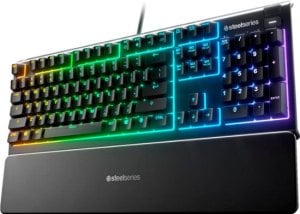
One of the selling points with membrane keyboards is how silent they are and the Steelseries Apex 3 makes that one of its main features.
The Apex 3 is a full-sized, membrane keyboard that carries numerous features like media keys and a volume knob. It does all of which while maintaining to stay somewhat lightweight, especially when compared to other, more premium mechanical boards that have even less extra features. It also comes with a palmrest that magnetically snaps onto the bottom of the board which is pretty convenient and comfortable, especially after long gaming sessions. However, the Apex 3 has its share of faults too. Even though it is a membrane keyboard, the keys feel soft and chunky when compared to other membrane keyboards like the HyperX Alloy Core and the Razer Cynosa, both of which are in direct competition with the Apex 3.
For Steelseries fans out there, the Apex 3 is a pretty solid, basic membrane keyboard that features a lot of the same basic things that other keyboards in its realm feature: quiet keys, media functions and RGB backlighting. While the softness of the keys is due in part to its advertised quiet performance, the chunkiness of the key presses could turn some people away. But at $50, the Apex 3 is still a really solid membrane keyboard to consider.
Logitech G213
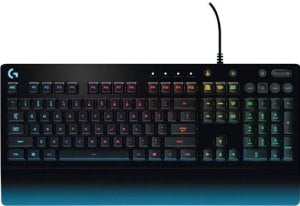
It’s not often that you find a Logitech product of any kind for under $50, but when you do, Logitech’s history says to grab it. Their G213 keyboard is no exception to that ideology.
Despite being a membrane keyboard, Logitech claims that the G213 delivers four times the performance of any standard mechanical keyboard, making it possibly the fastest membrane keyboard in the market if true. But Logitech G’s focus remains on gaming and gaming performance and the G213 does in fact stay in line with that. The keycaps replicate that of a mechanical keyboard (minus the sound that usually comes with a mechanical keyboard like that of the G Pro) and don’t require a ton of pressure to actuate, giving it its reportedly fast response time. It features RGB backlighting and Logitech’s LIGHTSYNC technology that can activate the keyboard to light up in specific ways for specific games (try Battlefield V). It also features a palm rest for those long gaming sessions to keep you comfortable throughout, which is a nice, quality-of-life kind of feature.
Coming in at just $50, and on sale for slightly less more times than not, the G213 is a high-quality, entry-level gaming keyboard that seems to bring the qualities of a mechanical gaming keyboard without the high cost or sound. If you are looking for your first gaming keyboard, and want to get it from a trusted PC brand like Logitech, this is the one.
Related: How to Clean a Keyboard Properly | Computer Keyboard Cleaning Guide
HyperX Alloy Core
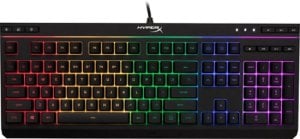
The HyperX Alloy Core RGB membrane keyboard is probably the most commonly used and purchased membrane keyboard out there. At least, more times than not, it's maybe eight or nine out of every 10 first-time PC gamers' first gaming keyboard of any for several good reasons.
First off, it is comfortable and simple to use. If you are looking for a cheap entry-level gaming keyboard, that is just about all you need. The Alloy Core features similar quality to its more premium Alloy Origins cousins including bright RGB backlighting that can be changed on the board itself, dedicated media keys (which is much more of a big plus than you’d think), and fast responding, ABT keycap-like feeling keys despite “just” being a membrane keyboard without the instantaneous switches. It's also somewhat spillproof, allowing up to 120 ml of liquid to spill on it. Now, we don't personally recommend spilling liquid on your keyboards, however just know that a little, accidental spill won't be the end of the board.
It’s very quiet, soft and smooth to use with a solid, braided attached USB cable that won’t fray or easily tear. The Alloy Core is also compatible with both generation Playstation and Xbox consoles for those who want to use a keyboard and mouse on console, giving it surprising versatility. With it costing just $50 everywhere and usually less when on sale (which it usually is), the Alloy Core is a strong, first gaming keyboard.
Corsair K55 Pro
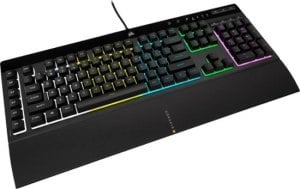
Personally, Corsair’s products continue to surprise me and the K55 membrane keyboard is no exception. And, if we're being honest, the K55 is actually quite the pleasant surprise amongst all of the boards on this list.
The K55 still features the similar membrane base that the rest of the keyboards on this list do, using rubber domes underneath the keycaps for actuation which still gives a soft yet satisfying and effective response that doesn’t feel spongy due to the membrane base. It may not be the well-beloved cherry switches, but these actually aren’t all too far off. The K55 features a plastic build, unsurprising considering its $50 price tag and dedicated media keys toward the upper right corner which aren’t backed by the RGB backlighting that lights up the rest of a board, an interesting move for the K55 considering that the HyperX Alloy Core features similar media keys and has its own backlighting. The K55, however, also features six macro keys on the far left of the board for you to program for whatever you need and can be programmed via Corsair’s CUE software or on the fly with a dedicated macro recording button at the top. Oh yeah, it also features a comfortable palm rest like the other boards here.
Corsair’s keyboards are usually feature-rich and despite being a “budget” membrane keyboard, the K55 follows that trend almost to the detail, highlighted by its six dedicated macro keys. It’s the lone keyboard on this list that features dedicated macro keys and competes with both the Razer and HyperX board in terms of performance. This actually feels and features a keyboard that’s worth a bit more than its $50 price tag.
Razer Cynosa V2
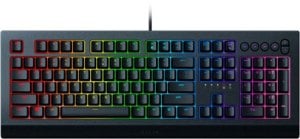
If the HyperX Alloy Core RGB seems a bit too basic of a gaming keyboard, and you are looking for something purely much more dedicated for gaming, the Razer Cynosa V2 is also a great place to start, especially for first-timers. It is a budget-friendly, membrane keyboard that feels anything but budget-friendly, giving you the premium experience that almost all of Razer’s products provide, while being straightforward and easy to just plug in and you for newcomers throughout.
Much like its rival Alloy Core, the Cynosa V2 is a full-sized keyboard also features dedicated media keys in the top-right corner of the board and the membrane design is still as front-and-center as possible. The RGB backlighting gets a bit of an upgrade here compared to the Alloy Core and the original Cynosa as the V2 features dedicated per-key backlighting similar to what we would see on the more premium mechanical gaming keyboards, a nice premium-looking change when compared to the Alloy Core’s more basic full board backlighting. The Cynosa V2 performs great for both gaming and typing. It feels and responds fast and smooth with ABT plastic keycaps that don’t feel cheap one bit and also mostly sound as quiet as one would expect from a membrane keyboard. There are times when the keys on the Cynosa V2 sound a bit squeaky, but it’s not so bad that it should be a deal-breaker.
The Cynosa V2 comes in just $10 more than the previously mentioned HyperX Alloy Core, and even though $60 for a starter-level membrane gaming keyboard seems kind of high, you are getting a fairly premium-feeling and performing product at a fraction of what the board would cost if it was mechanical.
For more Hardware Guides, check out 2021’s 5 Best 60% Keyboards for Gaming | Best 60 Percent Keyboards on Pro Game Guides!
This article includes affiliate links, which may provide small compensation to Pro Game Guides.








Published: Sep 4, 2021 11:58 am